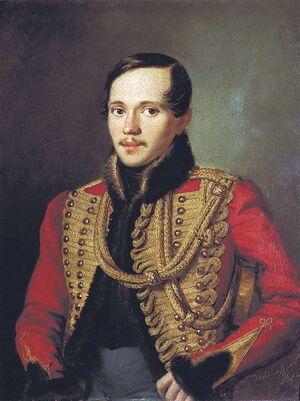Anna Khvostova and Mikhail Lermontov: Difference between pages
Tchaikovsky Research
(Difference between pages)
No edit summary |
No edit summary |
||
| Line 1: | Line 1: | ||
{{picture|file= | {{picture|file=Mikhail Lermontov.jpg|caption='''Mikhail Lermontov''' (1814-1841), painted in 1837 by Pyotr Zablotsky}} | ||
Russian | Russian writer, poet and painter (b. 3/15 October 1814 in [[Moscow]]; d. 15/27 July 1841 at Pyatigorsk), born '''''Mikhail Yuryevich Lermontov''''' (Михаил Юрьевич Лермонтов). | ||
==Tchaikovsky's Settings of Works by Lermontov== | |||
* Tchaikovsky's song ''The Love of a Dead Man'' (Любовь мертвеца), No. 5 of the [[Six Romances, Op. 38]] (1878), is based on Lermontov's poem of the same name published in 1841. | |||
* Tchaikovsky's chorus ''[[The Golden Cloud Did Sleep]]'' (Ночевала тучка золотая) was written in 1887 to words from Lermontov's poem ''The Rock'' (Утес), published in 1841. Some years previously, in 1874, Tchaikovsky had made an orchestral arrangement of [[Aleksandr Dargomyzhsky]]'s vocal trio ''[[The Golden Cloud Did Sleep (Dargomyzhsky)|The Golden Cloud Did Sleep]]'', which was set to the same words. | |||
On at least two occasions between October 1889 and March 1893, Tchaikovsky also considered writing an opera ''[[Béla]]'' (Бэла), after the first part of Lermontov's 1839 novel ''A Hero of Our Time'' (Герой нашего времени), with either [[Anton Chekhov]] or Vladimir Nemirovich-Danchenko as possible librettists. However, neither of these projects came to fruition. | |||
==External Links== | ==External Links== | ||
* [[wikipedia: | * [[wikipedia:Mikhail_Lermontov|Wikipedia]] | ||
* {{viaf|14772733}} | |||
[[Category:People| | [[Category:People|Lermontov, Mikhail ]] | ||
[[Category: | [[Category:Writers|Lermontov, Mikhail ]] | ||
Latest revision as of 11:25, 17 August 2023
Russian writer, poet and painter (b. 3/15 October 1814 in Moscow; d. 15/27 July 1841 at Pyatigorsk), born Mikhail Yuryevich Lermontov (Михаил Юрьевич Лермонтов).
Tchaikovsky's Settings of Works by Lermontov
- Tchaikovsky's song The Love of a Dead Man (Любовь мертвеца), No. 5 of the Six Romances, Op. 38 (1878), is based on Lermontov's poem of the same name published in 1841.
- Tchaikovsky's chorus The Golden Cloud Did Sleep (Ночевала тучка золотая) was written in 1887 to words from Lermontov's poem The Rock (Утес), published in 1841. Some years previously, in 1874, Tchaikovsky had made an orchestral arrangement of Aleksandr Dargomyzhsky's vocal trio The Golden Cloud Did Sleep, which was set to the same words.
On at least two occasions between October 1889 and March 1893, Tchaikovsky also considered writing an opera Béla (Бэла), after the first part of Lermontov's 1839 novel A Hero of Our Time (Герой нашего времени), with either Anton Chekhov or Vladimir Nemirovich-Danchenko as possible librettists. However, neither of these projects came to fruition.

